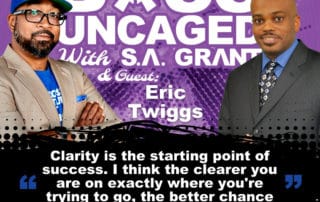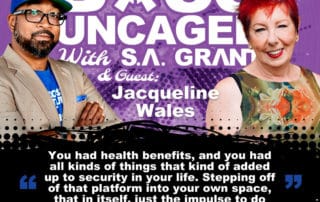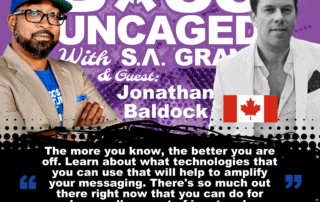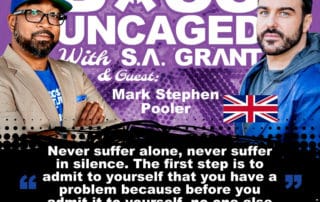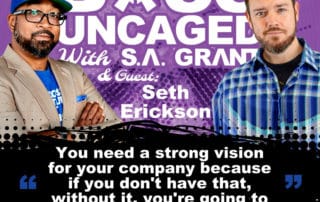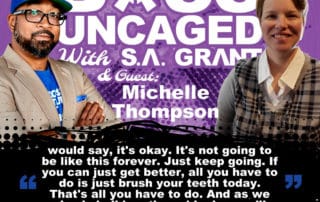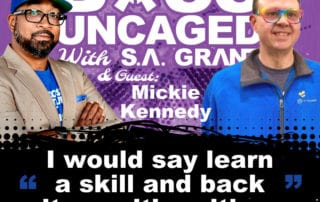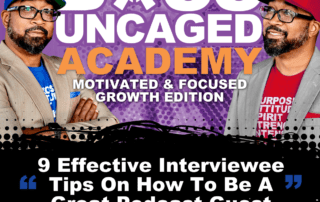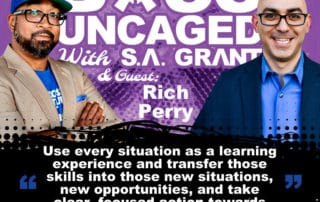Author, CEO, Business Coach Of Profit First Professionals: Eric Twiggs AKA The What Now Boss – S2E58 (#86)
Boss Uncaged Podcast Overview
- Learning from Failures
- The Importance of Mentors
- Boundaries and Work-Life Balance
- And So Much More!!!
Boss Uncaged Podcast Transcript
S2E58 Eric Twiggs.m4a – powered by Happy Scribe
Live. One, two. All right. Three, two, one. Welcome. Welcome back to Boss Uncaged podcast. Today’s show is going to be an interesting conversation with my man, Eric over here, and I’m going to deem him. Everybody on the show. I usually give a nickname, too. So I’m going to deem him the what now, boss. So, Eric, why don’t you go ahead and give our viewers a little bit about who you are?
So I am your procrastination prevention partner. I’m the author of The Discipline of now, and I’m the host of the 30 Minutes Hour podcast. And I help entrepreneurs and executive leaders to ditch their excuses to beat procrastination so they can make more money, get more done and feel more confident. Okay.
So I definitely love that. I mean, you’re bringing energy to the table. So with that, if you could define yourself in three to five words, what three to five words would you use to define yourself?
Well, I would define myself just by my values. Right. So one of my values is anti fragility. And I got that from this book. It’s called Anti Fragile by Nassim to Leave. And it’s really about when you face adversity that you actually come out better. You’re anti fragile. So that’s one of my values. My other value is radical honesty. I’m that person that’s going to tell you. No, that shirt doesn’t look right. You’ve got Greens in your teeth. I think my clients appreciate that. I’m going to be brutally honest and upfront. And then integrity will be the third word, because I think you have to walk the walk and talk to talk. If you say you’re going to do something, you need to do it, you need to be where you say you’re going to be when you’re going to be there.
Got it. So let’s just dive into I think one of the things that you brought up as far as defining yourself in the earlier stages of this podcast was talking about procrastination. So a lot of people don’t just kind of define that business. Like, how do you turn being a procrastination specialist into an actual business? What does that journey look like?
So basically, that’s a common problem, the procrastination issue for entrepreneurs and executive leaders. And so when I work with them, we unpack what’s holding them back. And what happens is a lot of times it’s a lack of awareness, right? Like I’ve yet to meet anybody who just procrastinates all the time on everything. It’s usually like a specific area in their life. And usually it’s something that’s going to move them forward. If it’s getting another location for their business, if it’s hiring that virtual assistant, if it’s something that can move them forward, they start listening to that voice of fear, and that comes out. So I help them to unpack that. I help them to look at how they’re spending their time. And once we kind of agree on what the root cause is then that’s when we can really start to put the solutions in place. Now I do that coaching one on one. I’ve done group coaching. And also I do workshops and keynote presentations.
Growing up as a kid, obviously, you weren’t thinking that you’re going to be walking around talking about helping people procrastination. So what does that look like as a kid going into an adult, when did you start out the whole thing?
That’s a great question. The whole thing started for me in College, right. So it was my senior year in College, and I’m having this conversation with a good friend of mine named Donnell. And he and I were a little different at the time. He was all about his purpose. And I was all about the party. And I’m like, hey, man, you need to loosen up. We have plenty of time for all the serious stuff. You come into part with me or not. You’d always say, Eric, man, you need to get serious, figure out what you need to do. We had this conversation and then, like, several weeks go by and Donnell and I don’t talk. And I got phone call from his mother telling me that he was tragically killed in a car accident. Wow. That changed everything for me. That sent me a message that maybe I don’t have the time that I think to do the things that I need to do. And it was really from that moment on that I really started focusing in on how I’m spending my time and am I being productive? And what is it that I’m procrastinating on? And that’s really what the start was. Where the start was.
Yeah. That’s definitely an eye opener and essentially change your life. Right. So, I mean, it got you to the point to where you realize that you were procrastinating and you became a specialist in procrastination, which is kind of like the opposite end of the coin, which is definitely interesting. So with that, right, what’s the worst experience you’ve had trying to help someone understand why they’re procrastinating?
Well, I just see people who they just can’t move forward because they just won’t take the steps. Like, if it’s, for example, they get stuck in the weeds, and before they can get their business to that next place, they need to hire their replacement. And there’s a specific example that comes to mind. And it’s like, on a head level, they know it. But there’s this fear again we talked about earlier. I tell me when you’re trying to do something aspirational you have the voices in the head that say, okay, well, what if this person doesn’t work out? What if I can’t really afford this person? What if sales just drop off the cliff when I bring this person on? And so what this person would do is he would start doing a lot of other projects around the shop, and he would start building all of these templates and start building all these. But really, he was hiding. And the problem was that he’s still at the same level because he’s not taking the steps to move forward. I mean, that procrastination. So here’s what I teach people. Sometimes we think that it’s an either or thing like, okay, well, I can’t move forward with the business because I have to do all my research. You can do both. You can do research and move forward at the same time. So while you’re researching, you can take small steps in the direction of what you want.
That’s definitely interesting. Essentially, what you’re saying is that that particular client was procrastinating by doing busy work. So let’s unpack that a little bit. I think a lot of people think if as long as they’re working and doing something towards the common goal of whatever their business unit is, that’s generally good. But what you’re saying is essentially, you have to kind of itemize out and figure out what’s the highest level of return of the thing that you’re working on versus working on everything and anything.
Yeah. So there’s a difference. I always tell my client there’s a difference between being active and being effective, right. And so sometimes when you’re being active, the root cause of procrastination a lot of times is discomfort you deep down, you feel like an anxiety about making that move and sort of make yourself feel better. You feel like you’re not in control. So to make yourself feel better, you start trying to find things to control. Oh, I’m going to straighten on my desk. I’m going to build all of these processes and procedures. I’m going to do all of these things. But deep then that’s just giving me a feeling of control. The real issue is that I’m scared to move forward with the bigger plan. So, yeah, I think and you have to also know that 20% of the things you’re doing are going to get you 80% of your results.
Very true. So in your business, obviously, we’re going to dive into some more facets and more arms of your business. You’re kind of like an octopus, in the sense. Right. So how was your business structured? Is it the LLC and S-Corp or C-Corp?
LLC Absolutely.
Great. So do you have any partnerships in your businesses?
Oh, sure. So I have another business. It’s WNM Ventures LLC. And that’s really what you had mentioned, the What Now movement. You kind of hit it at that earlier where I’m the President and I’ve got two other business partners. So I’ve also got a media company, the 30 Minutes Hour LLC. They technically 30 Minutes Hour Media LLC. And that’s me and my podcast co host. So I’ve got several. And then I have Eric and Twins Associates, which is an LLC.
And that’s just me the reason why I brought that up, because, I mean, in partnerships, you have solopreneurs, you have entrepreneurs, you have corporate structures. You have all these different variables. But when you come down to having a business with a partner, it’s a different monster, a different animal. So kind of like, what procedures did you guys have in your corporations? That kind of keep things level.
So I think the biggest thing and I’ve seen this from people I’ve worked on the other side that I’ve coached where they have partnerships, they don’t have things in writing, right. Let’s say when you start your great friends. So you think, oh, man, we don’t need to put this stuff in, right? We go way back. We go back to high school. But when you start, what I find is those little decisions in the beginning, they make that really big. Once the money starts coming in and things start evolving. So the best thing would be to get with a really good attorney and make sure you put together a clear operating agreement. Like, okay, if partner wants to leave the business, what are the conditions? What needs to be in place? We want to add people to the partnership. What are the conditions? How do we break the tie? Is there a tie breaker? We just can’t agree. Is there someone who is the president’s, CEO? So I think that where I see partnerships go sideways is they don’t have everything clearly spelled out on paper.
Got you. Yeah. I think that’s definitely true. And solid, solid advice. So this is going into your journey, right? I mean, obviously someone here in this podcast, this may be the first time they’re hearing from you, and they may be like, this guy is a great success. He has all these different business ventures. They’re all successful. And to them, it’s perceived to be an overnight success. But in reality, how many years did it take you to get to where you are currently?
Years? I mean, I started in 2011 with Erica M. Twig. Associates. Now, I hope no one thinks that this is just all Sunshine and rainbows, because it’s definitely not the case. I think I would tell you, you have to factor failure into your success plan. But the key is you need to learn from the failures. And the other thing, I think is helpful to have mentors who have the results that you aspire to and actually listen to their advice.
Got you. You brought up a solid point about, like, mentorship, right. And I always kind of have this ongoing debate, education versus coaching or versus buying online courses. Do you have a particular stance on which way to swing to start out?
Well, I think they all can be helpful. Again. I would just look at the source, whatever it is, if it’s a book, if it’s an online course, if it’s a master class, if it’s somebody you’re picking up the phone to. The bottom line is, do they have the results that you aspire to? So if you aspire to you want to podcast with 100,000 downloads, it’d be good to talk to somebody who has 100,000 downloads on their podcast. They’re going to be able to give you the best advice. I think that’s the key, but they all can be helpful. And a lot of things I think depend on your learning style, right? Like, some people learn better just to hear, like, an audio program. Some people need to be in something where they can participate and ask questions and see the person talking and all of that. So I think you have to really make your decisions based off your learning style. Interesting.
So let’s say time travel is real, right today you could teleport back 10, 15, even 20 years. What’s one thing that you’d want to change or do differently if you could do it all over again?
I would have gotten into the podcasting game a lot earlier. It’s interesting. A lot of times people were around. This is probably around 2014, 2015. Starting then, people were hinting to me, people always say you’d be good on a podcast. You should think about starting a podcast. And my thought was always, yeah, I don’t need anything else to do. Yeah. Okay. That sounds nice. But I’m always shocked at how much I enjoy podcasting. And a lot of the people that have 100 million downloads started early during that time when everybody else was really focused on blogging. So that’s probably something I would have gotten into the podcasting game much earlier if I could go back in time.
I think it’s funny that you said, I think majority of podcasts that I’ve spoken to and just that I know personally, I think that’s a commonality, right. It’s kind of like once you get into podcasting, it becomes a way of life. It becomes a way of living. And then you look back and like, well, if I interviewed 100 people, well, damn. If I had did this two years ago, it would have been 200, 300, 400 people. And then your network would have been so much more larger and multiplied. And you would have been able to scale a lot faster if you had done this earlier on. So I definitely agree with that last statement of yours. So going into, like, you personally, right. I mean, you have the tenacity, you have the business mentality, you have strategy behind you. You have the business savviness. Does that come from an entrepreneurial background? Any family members in your family have that hustle with them?
Well, my dad, he’s always had a little entrepreneurial thing going on. He was in the real estate. He’s on social media. So he’s someone that he’ll just get in there and just figure it out, right? He’s more social media savvy than some millennials. He just gets in and figures it out. And so just kind of watching him. I think I kind of followed his example as opposed to, like, some people will say to me, oh, I don’t know how to do that. I don’t know. This is something that just really gets me. I ask them a question, what do you think we can do to improve? Oh, I don’t know where you asked me that question. Even if I don’t know, I’m going to get the answer. My response is like, you know what? I’m going to find out, and I’m going to figure it out if I need to call somebody. But I think that’s the key. I don’t think I’m necessarily a natural, but I think it’s just something I just work at constantly. And I think my dad was a good example for that.
So coming from obviously being somewhat of an inspiration from your dad, right. And in today’s world, obviously, you’re older and potentially you have your own family now. So how do you juggle your work life with your family life?
Yeah, it’s a challenge. So people talk about work life balance. Right. So for me, it’s not necessarily that you work less. I think that’s misunderstood. You think? Okay, if I have work life balance, that means I’m just working less. So I think the key is that you’re not neglecting the key areas in your life. That’s true. Work life balance. So there may be seasons where you’re going to work more. You’ve got aggressive goals that you want to hit, and it’s going to require you to put in that work. But the key is that you’re communicating with the people that other people in your life that are important to you, and everybody kind of understands the big picture and that you are not neglecting those areas. So that means when you’re with them, that you’re fully present, you’re giving them time. And I always say whatever is important to you, you put it on a schedule, you put it on your calendar. So putting the calendar time for family and other areas of your life that aren’t related to the business can really help you to achieve that balance.
Yeah. I definitely condole that. I mean, it’s one of those things like, I know anyone that may be younger right now, maybe listening and saying, Why the hell do I need to schedule every aspect of my damn life on a calendar? But once you start getting into the rhythm of doing that, then you don’t really have to worry about the work life balance. Everything is essentially associated to a time frame. And once that alarm goes off and a notification pops up, then you’ll make that time because it’s in your schedule to do exactly that. So I definitely think that’s some great advice. So going into your morning habits, what does your morning routine look like?
I usually wake up. Usually it’s around 4:30, and I have a time for prayer and meditation. From there, I go to the gym and get my cardio and do some form of weight training. And then when I come back, that’s really when I start my day I start working with clients or start writing something or start preparing for a podcast. So that’s my typical routine. But the initial thing I just mentioned for me, it’s almost like brushing my teeth. I’ve made it such a habit. I don’t care what’s going on. I’m going to find a way to make it work.
Nice if you’re waking up at 4;30. Like, what time do you usually go to bed?
Well, I try to go to bed by 10:00, right? Everybody’s going to try. We have a ten year old and a seven year old. Sometimes things come up, but that’s my ideal time. The other thing for me, too, is I take naps where I can throughout the day because I think you have to factor in recovery again. I’m just talking from my experience. It helps for me to work in sprints, but then have time where I’m just in recovery mode and then usually after, like, for example, especially on a Monday when I’m doing my podcast 30 minutes hour, I make it a point to make sure I work in a nap because it’s later in the evening. And based on my body clock, I’m a morning person. I know that about myself. So my energy peaks early in the morning, and when you start to get in the evening time, my energy cycle starts to go down. So for me to offset that, I’ll work. So I’m working on the fourth and all that. But I also work in a nap, and that kind of helps to reset my clock. So when I get on the podcast, I can come across with energy. Nice.
So earlier on in this episode, he was talking about you being an author, and I’m also an author as well. So just being in that space of reading books and developing books, I created a book club. So are there any books that helped you on your journey that you would want to recommend? And also are there any books that you’re currently reading right now that you would want to recommend?
Yes, I mentioned one at the beginning. It’s called “Anti Fragile”, and it’s by this Nassim Nicholas Taleb, and it’s complicated, just a deep, complicated thinker. But I think if you really grasp that you really can become unstoppable if you get to the point where you have setbacks, but you become better because of the setback. What do you have to be afraid of if you always just start looking for ways to improve from Adversity and then the other book I would recommend. This is for me, just Foundational, Napoleon Hills, Sink and Grow Rich. I could just read that over and over again and still have notes I’m taking? I’m like, oh, man. Yeah. I need to really implement that.
Yeah. I mean, that book has been brought up in this podcast at least, like, two dozen times, and it’s one of those books to your point. If you read that book the first time you read it, you’re going to take away maybe two 3% of action items. A year later, you read again and you’re like, wow, I missed this the first time, and you got new action items. Ten years later, you read again. And it’s kind of like every single time you read it, there’s more and more Nuggets a it’s never ending book of jewelry that keeps dropping in your lap every single time you read it, though. Definitely..
Sorry to Interrupt. So think about it. I mean, timeless principles. He wrote that it was like in the 30s, and his whole thing was he found people that were the most successful people of that day and just made note of what they did. And I think that’s something we all can apply. Find people that are successful. What are they doing?
Yeah. I wish he was still around because I think he can write a book on evergreen, like, just a book, just about an evergreen topic. How to select evergreen topics. Because he obviously did it. He’s done it to the point to where almost daily, 100 years later, we’re still reading his book and getting information from it from Damian 90 years ago. So to your point, it’s definitely a commendable book. So with all the information, right. So where do you see yourself 20 years from now?
20 years from now, I will have helped millions of people to move forward. One of my thing, I want to help 10 million or more people to move in the direction of their goal, their ultimate dream. The most rewarding feedback is when people tell me that, hey, I listened to your audio. I read your book and that inspired. I was procrastinating, but that inspired me to start my business. Now I have this business now. So when I get that type of feedback, it’s so rewarding. And so that’s really what it’s all about. Just really moving people. I want to be close. I should be a lot close to that 10 million number. If I’m helping the 10 million people, I think anything else I would want will take care of itself.
I think it’s definitely a reachable number. But what do you have systematically in place to scale to that number? Because as one individual getting to 10 million people, that’s multiple lifetimes. So what system do you have in place to scale to that number?
Yeah. With the internet and social media, you have that reach having the what now movement group. We’ve got all kinds of entrepreneurs and executive leaders in that group. We’re tied to YouTube with the podcasting. I just believe that over time. As. Even having a book you just never know. I’m interviewed from people in Australia, England, Dominican Republic, all around the world. So the good thing in the time we live in your next level is literally one mouse click away. All it takes is for that one person that resonates with your message to spread it to the next person who you just never know. So I certainly think in that time at the 10 million numbers possible. Definitely.
You got a lot of technical. You got a lot of things going on. You have a lot of business ventures. You have a lot of different strategies in place, like what systems or software and pools do you have in place that you would not be able to do what you do currently without?
Well, just getting basic. I use Google calendar, so I’ve got everything that’s scheduled. I know the appointments I have, and I get reminders. I have a virtual assistant, and I would just advise anybody who’s on the fence get a virtual assistant, especially if you’re in the entrepreneurial space. If you’re an employee and you have a side hustle, I think that’ll just really, she has been like a lifesaver. Her name is Esther, and she does a fantastic job. I believe you probably talked to Esther, communicated with her, but she saves me a lot of time. I try to be as effective as possible with email, like I’ll set up my email, so certain things just flow automatically folders. So I don’t really have to touch and process things. There’s also I use as far as clients I deal with, I might use Salesforce just to kind of keep them organized. So a lot of different things.
Yeah. Definitely talking about VAs and PAs. Right. And I’ve given this advice before. It’s kind of like the sooner you get them, the easier things would be. And obviously you want to scale, you get more of them and you give individual tasks to either one of them or to all three of them. Right. So with your current VA, right? Is she stateside or is she international?
She’s international. She is in Kenya.
Nice. That’s another golden nugget that I would talk about, like spreading your wings and going international, not just for the cost, but it seems that when you get a VA from overseas, they just pay attention to certain details because they want to earn their keep. Do you think that’s true for your VA as well?
Well, I think it’s that and they just have a different perspective. There are very few people that just kind of get it. Some of you tell them certain things. She thinks like, I do we have a similar mindset. And so she got out and seen certain podcasts and said, I think that it could be an international podcast that I would have never thought of. But she’s looking at it more from a global perspective because she has to. She’s in Kenya, and I’m here. So I’m thinking about, hey, what about this person that’s in Texas? She’s like, okay, what about this person that’s in Australia? What about this person that’s here? I think it works very well. Yeah.
I think diversity because one of my VA is an application program developer. So when I first found him. He wanted to be a VA, and I’m like, okay, cool. Here’s your task. And I’m always big on communication. So I’m talking to him and saying, okay, what’s your background? What do you really want to do and come to find out? He builds software, he builds applications, and he does web development and web design. I’m just kind of like, well, that’s kind of not really a VA. You’re more a little bit more valuable than just a standard VA. So you had opportunity to kind of give him more tasks designed in his principle of his education and still have him do things that may be VA, but 100% technical stuff versus just doing every single day scheduling and programming. So going into, like, your now movement, let’s just talk about that a little bit. What’s this network and how does it work? How does somebody get involved in that community?
Let me give you the backstory. So the Wet Now movement. We started this last April, actually coming up in a year, and it started because we would run into people who had this goal. They were going to start this business, let’s say and they would say, yeah, but I’m going to wait until things get back to normal. And the question and the three of us, myself and my two business partners know they should be saying that it should be like, what now? And we say we’ll call this the What Now Movement. And then also, we had our Wet Now experience because before the Pandemic, the three of us were planning on we had this venture we’re going to do we’re going to actually start doing conferences. We’re going to get hotels, get people to the conference and get speakers in. Great idea. But then the Pandemic shut all that down and we said, okay, we still want to work together. So Wet now. Oh, you know what? We can do some things virtually. So we started the Wet Now Movement. Right now, we got close to 1600 people, and it’s a Facebook group called the Wet Now Movement. And basically our mission is to provide people with tools and resources that inspire them to pivot. Instead of just saying, I’m going to wait until things get back to normal. They make a pivot. I can do some of this virtually. I can start creating digital products. I don’t have to do it the traditional brick and mortar way. There’s different pivots. So we create content within the movement to inspire people to pivot. We’re finishing up. We’ve got a master class. We did a seven week masterclass. So this is going to be coming. Saturday is going to be the last session of the master class. So it’s a really good thing going on in a What Now Movement group.
Nice. So going into, like, final words of wisdom. Right. Let’s say I’m an entrepreneur. Let’s say I’m in my early 20s, mid 30s, maybe I’m going through a midlife price since I’m 50 years old and I’m asking myself that question, what now? So I’m asking you as this individual, what words of advice or words of wisdom would you have for me for me to continue to move forward, to move past the what now?
Clarity is the starting point of success. I think the clearer you are on exactly where you’re trying to go, the better chance you have of getting there to really get clear. I don’t care if it takes a coach if it takes a mentor, but really take the step of getting clear of defining exactly where you’re trying to go and then keeping that vision in front of you at all times, because to me, this is going to sound crazy. But I think the why can be more important than the how sometimes the why when you’re really clear on what you want a lot of times, the how start falling into place and you start attracting people that can help you with a competency or some type of skill that you’re lacking that can get you there. But I would say that’s my advice if you’re 20, if you’re 40 and you’re 60, really make sure you’re clear on what the destination looks like and make that your starting point. I would also again, don’t be afraid to invest in yourself and in your business.
Definitely. So with that, how do people get in contact with you? Obviously, you have Facebook, you have YouTube, you have courses online. How do they get in contact with you?
Go to my site. It’s ericmtwiggs.com. You can go right to my website and then E-R-I-C-M- T-W-I-G-G-S .Com. You can pick up a copy of the book The Discipline of Now Twelve Practical Principles to Overcome Procrastination. You’ll see my email information, but the central hub they reached me will be right there through the site and then they can also join the What Now movement group as well in Facebook.
Nice. So going into the bonus round, right. What is your greatest achievement to date outside of family, outside of kids? What’s the most significant achievement you’ve made so far?
I would say for me, getting my spiritual house in order to me, I think for me, the spiritual foundation is everything. And I think that’s the number one thing, because that’s really what’s giving me the clarity. And my spiritual foundation is what’s attracted the good things I have in my life, my family, the business. It all goes back to that spiritual foundation. So I think finding that I would say is the greatest achievement, very powerful stuff.
So another bonus question for you, if you could spend 24 hours in one day uninterrupted with anyone dead or alive, who would it be and why?
Nelson Mandela? Here is why. So I don’t understand how he was able to do what he did the way he did it right. Nelson Mandela was in prison for 27 years and came out of prison and wasn’t vengeful. And he had opportunities where he could have gained power. And he really could have gotten revenge on some of the people that held him captive, which most people probably would have. But if he wanted to move forward, he wanted to stay positive. But I would just like to talk to him and find out how was he able to do that? How are they able to come out and not be bitter? I heard an interview where they said the reporter asked him, how did you survive 27 years in prison? How did you survive for that long? The answer was, oh, no, I wasn’t surviving. I was preparing just an incredible person. I would just want to ask him how he did it because I would like to think that I would be that forgiving. But it will be a challenge. It will be a challenge. I would say Nelson Mandela would be my person.
I think he’s the epitome of mindset. I mean, to be in jail that long and not to lose your damn mind and to come out and come out not only to become successful but become a global figure of that magnitude after losing over a quarter of a century. It’s crazy. So I definitely agree with you with Nelson for sure. So going in the closing of my podcast, usually, if I’m interviewing someone in our conversations, you may have had some questions that have come up that you want to ask me. So this is a time. That what questions do you have for me?
It looks like you’ve got a lot of successful things going as well. Where do you see yourself in the future? What is the horizon look like for you?
So for me, I’ve had this question asked me in different ways, and it’s very similar to your answer. And it says that I want to be able to impact people’s lives, right? Particularly entrepreneurs, small business owners, people that are wanting to jump or they’re being hindered from that jump due to fear. Right? That’s the one hand. That’s why it’s called Boss Uncaged. It’s about people that want to become bosses, but they’re inside of a cage and they’re trying to figure out how to break out that cage and release the inner animal inside of them and do whatever they want to do that’s on one hand, on the other side, I’m creating all this essentially as a legacy for my family, my kids and my grandkids, because once I’m dead and gone, all this information is going to be there. The Internet is not going anywhere, right? Unless we have an EMS attack and everything goes under the grid. But until that happens, this information will be online, and my grandkids and my great grandkids have an opportunity to see this evergreen content, much like Napoleon Hill and more people I interview like yourself that’s delivering such valuable content, then that will be my legacy to leave behind.
That’s awesome. Yeah. Kind of like that. You go to the construction site and there’s the cement and you write your name. So once the cement dries, years and years later, they can see that Eric was here. That. Yeah. I think that legacy thing is powerful.
Yeah, definitely. Well, I mean, I definitely appreciate you taking time at your busy schedule, and I think you definitely develop some information for people to think about. As far as definitely. In the beginning, we talked about Procrastination, and I just want people to kind of if you don’t remember what we talked about, I want you to rewind us back and really listen to what Eric was saying about Procrastination and not just being a workaholic to work. You’re going to work with purpose. And that purpose then leads you to the results that you want versus just working on random things. So again, I commend you for coming on the show. I thank you.
Thank you for having me. It’s been an honor.
Definitely S.A Grant over and out.

